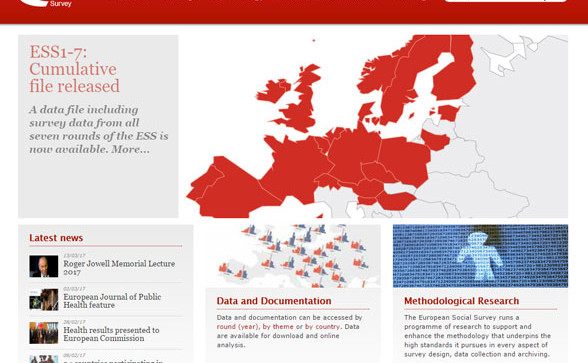Workshopy
21. - 22. 3. 2017
AKC, Husova 4a, 110 00 Praha 1
Výzkumná infrastruktura European Social Survey (ESS ERIC) spolu s českým uzlem ESS-CZ pořádá setkání Visegrádské regionální sítě ESS. Cílem setkání je prezentace a diskuze výsledků výzkumu na datech ESS (Perception of immigration; Understanding democracy/Trust in institutions/Fear of Crime; Work-life balance), diskuze o národních politikách podpory sociálních věd v Česku, Maďarsku, Polsku a na Slovensku a udržitelnost účasti zemí V4 v projektu European Social Survey.
Day 1: March 21, 2017
13.30 – 13.45
- Henk Stronkhorst (ESS HQ): Introduction to ESS Visegrad regional network
13.45 – 15.15 Panel 1: Perception of immigration
Chair: Petra Anýžová
- Michal Kentoš (SAS): Perception of safety and immigration
- Dita Čermáková (IS CAS): Attitudes towards immigrants in Visegrad states: view of different concepts
- Zbigniew Karpinski (IFiS PAN): Changes in opinions towards immigration in Europe, 2002 - 2014: A multi-level analysis
- Vera Messing (HAS CSS): Causes of xenophobic attitudes in Hungary and the Visegrad countries: the potential roles of the threat of social marginalization and the education systems.
15.30 – 17.00 Panel 2: Science policy relevant for the region
Chair: Klára Plecitá
- Petr Ventluka (MEYS, Czechia): Advantages and challenges of participation in pan-European research infrastructures in Czechia, i.e. for researchers, policy makers and funders
- Dariusz Drewniak (MSHE, Poland): The main trends in science policy in Poland
- Kazimierz M. Slomczynski, I. Dubrow (IPS PAS/OSU, Poland): Representation of European Countries in International Survey Projects: ESS in Comparative Perspective
- Pawel B. Sztabinski (IPS PAS): Whether the enhancement of survey participation improves the sample composition. The example of ESS7 in Poland.
Day 2: March 22, 2017
9.30 – 11.00 Panel 3: Understanding democracy/Trust in institutions/Fear of Crime
Chair: Klára Plecitá
- Bence Ságvári (HAS CSS): Understanding and Evaluations of Democracy in Europe and in Hungary. The Challenge of Measuring an Abstract Concept Across Countries
- Jaroslava Pospíšilová (IS CAS): Are interested citizens more satisfied with the way democracy works in their country?
- Jozef Výrost (NC SK): Some examples of external validity of social trust in the ESS R1-7 data
- Eva Krulichová (IS CAS): Relationship between fear of crime and risk perception across Europe
11.15 – 12.30 Panel 4: Work-life balance
Chair: Petra Anýžová
- Dana Hamplová (IS CAS): Are working mothers happy?
- Denisa Fedáková (SAS): Thoughts about work-life (family) balance based on ESS V4 data
- Dániel Oross (HAS CSS): Can Women's Political Knowledge Explain the Differences in Women's Political Participation in Visegrad countries?
12.30 – 12.45 Meeting closure
Vědci / vědkyně:








Facebook
X
Tweets by SociologickyNewsletter